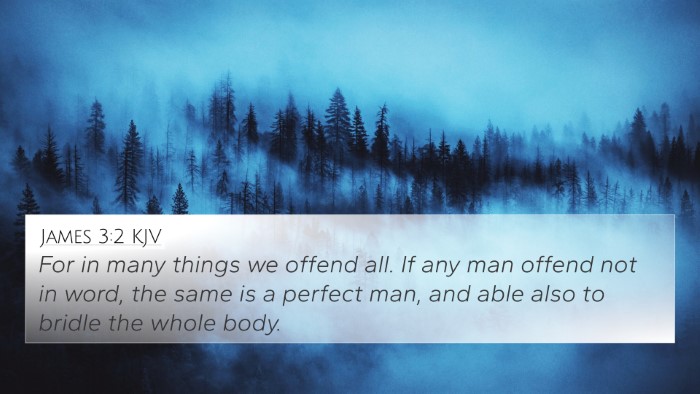Understanding Proverbs 20:9
Verse Text: "Who can say, I have made my heart clean, I am pure from my sin?"
Summary of Meaning
The verse probes the human condition regarding sin and purity. It reflects the innate struggle with sinfulness in human nature and highlights the impossibility of complete cleanliness or purity without divine intervention. The rhetorical question suggests that no one can genuinely claim to be free from sin, pointing to the universal need for grace.
Commentary Insights
-
Matthew Henry:
Matthew Henry emphasizes the futility in claiming self-righteousness and purity. He points out that all mankind is prone to sin and must recognize their own shortcomings. True purity is only achievable through God's mercy and grace.
-
Albert Barnes:
Albert Barnes expands on the human tendency to boast about moral achievements. He urges readers to examine their hearts diligently, acknowledging that while they may appear righteous externally, true righteousness comes from the Lord.
-
Adam Clarke:
Adam Clarke notes that the verse serves as a caution against pride. He believes it encourages humility and self-examination, recognizing that all have sinned and fall short of the glory of God (Romans 3:23).
Cross-References
This verse relates to several other scriptures that discuss sin and human nature, providing a rich context for understanding its themes:
- Romans 3:23: "For all have sinned and fall short of the glory of God."
- 1 John 1:8: "If we say we have no sin, we deceive ourselves, and the truth is not in us."
- Psalm 51:5: "Behold, I was brought forth in iniquity, and in sin did my mother conceive me."
- Isaiah 64:6: "All our righteousnesses are like filthy rags."
- Proverbs 16:2: "All the ways of a man are clean in his own eyes, but the Lord weighs the spirits."
- Jeremiah 17:9: "The heart is deceitful above all things, and desperately wicked; who can know it?"
- Romans 7:18: "For I know that in me (that is, in my flesh) nothing good dwells."
- James 3:2: "For in many things we offend all. If any man offend not in word, the same is a perfect man."
- Galatians 5:17: "For the flesh lusteth against the Spirit, and the Spirit against the flesh: and these are contrary the one to the other."
- Job 14:4: "Who can bring a clean thing out of an unclean? Not one."
Connections to Other Themes
This verse connects thematically to numerous concepts concerning sin, guilt, and the nature of the human heart:
- Thematic Connection to Grace: The recognition of sin fosters a deeper understanding of grace and the need for redemption.
- Sermon Preparation: This verse can serve as a foundation for discussions on human sinfulness, the need for humility, and the assurance of forgiveness in Christ.
- Comparative Study: Exploring the differences between Old Testament law and New Testament grace can enrich the understanding of this verse's implications.
- Inter-Biblical Dialogue: Comparing this verse with New Testament texts that address sin provides clarity on the consistent Biblical message of human depravity and divine redemption.
Tools for Understanding
To further explore the connections between Bible verses, consider using:
- Bible concordance for locating terms related to sin and purity.
- Online tools for Bible cross-referencing to find thematic links.
- A study guide for deeper examination of thematic Bible verse connections.
Conclusion
Proverbs 20:9 serves as a profound reminder of humanity's fallibility and the necessity of divine grace. Understanding this verse in light of its cross-references and related themes allows for a richer biblical study and facilitates a more profound engagement with Scripture.












